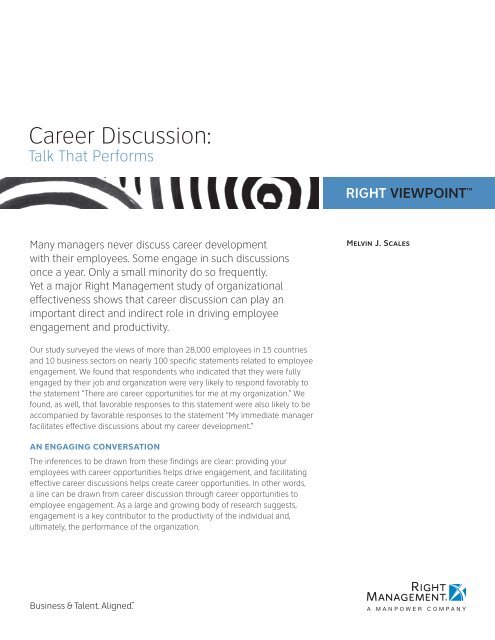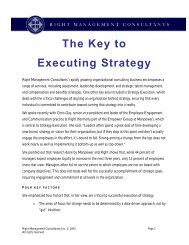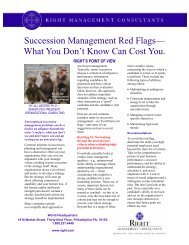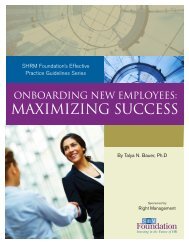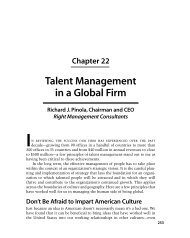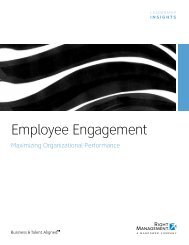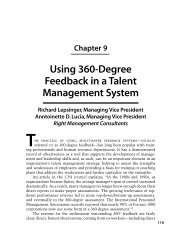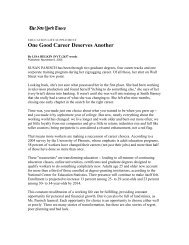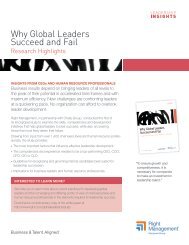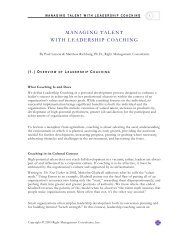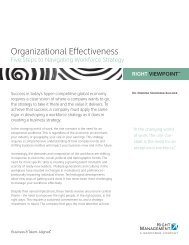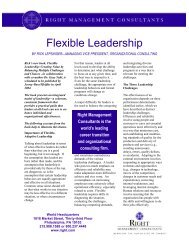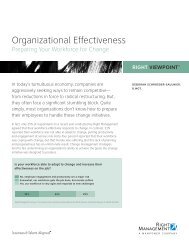Career Discussion: Talk that Performs - Right Management
Career Discussion: Talk that Performs - Right Management
Career Discussion: Talk that Performs - Right Management
Create successful ePaper yourself
Turn your PDF publications into a flip-book with our unique Google optimized e-Paper software.
<strong>Career</strong> <strong>Discussion</strong>:<br />
<strong>Talk</strong> That <strong>Performs</strong><br />
Many managers never discuss career development<br />
with their employees. Some engage in such discussions<br />
once a year. Only a small minority do so frequently.<br />
Yet a major <strong>Right</strong> <strong>Management</strong> study of organizational<br />
effectiveness shows <strong>that</strong> career discussion can play an<br />
important direct and indirect role in driving employee<br />
engagement and productivity.<br />
Our study surveyed the views of more than 28,000 employees in 15 countries<br />
and 10 business sectors on nearly 100 specific statements related to employee<br />
engagement. We found <strong>that</strong> respondents who indicated <strong>that</strong> they were fully<br />
engaged by their job and organization were very likely to respond favorably to<br />
the statement “There are career opportunities for me at my organization.” We<br />
found, as well, <strong>that</strong> favorable responses to this statement were also likely to be<br />
accompanied by favorable responses to the statement “My immediate manager<br />
facilitates effective discussions about my career development.”<br />
An engAging conversAtion<br />
The inferences to be drawn from these findings are clear: providing your<br />
employees with career opportunities helps drive engagement, and facilitating<br />
effective career discussions helps create career opportunities. In other words,<br />
a line can be drawn from career discussion through career opportunities to<br />
employee engagement. As a large and growing body of research suggests,<br />
engagement is a key contributor to the productivity of the individual and,<br />
ultimately, the performance of the organization.<br />
RIGHT VIEWPOINT <br />
Melvin J. Scales
Neither career discussion nor career opportunities, however, should be<br />
regarded as magic bullets. As our research shows, career discussion is one of<br />
several factors contributing to an employee’s sense <strong>that</strong> his or her organization<br />
provides career opportunities, just as career opportunities, in turn, represent<br />
one of several factors driving engagement. Engaging employees is a complex<br />
challenge requiring a multi-pronged approach.<br />
MAking A speciAl contribution<br />
Yet career discussion, we should recognize, can play a special role in driving<br />
both career opportunities and engagement directly. In the list of learning and<br />
development factors identified by our study as driving career opportunities,<br />
career discussion ranks seventh, but is clearly implicated in the first and third<br />
highest drivers:<br />
Top Learning and Development Factors:<br />
2<br />
1. I am encouraged to take ownership of my own development<br />
2. I receive the development I need to do my job well<br />
3. I know how to progress in my organization<br />
4. My organization invests in its people’s learning and development<br />
5. There is sufficient incentive to perform well at my organization<br />
6. My organization ensures <strong>that</strong> there are people ready to move into jobs<br />
when positives become available<br />
7. My immediate manager facilitates effective discussions about my<br />
career development<br />
Empowering employees, making them partners in their own development, is<br />
essential to providing them with career opportunities. It is precisely through<br />
career discussion <strong>that</strong> employees can be empowered—<strong>that</strong> they can be<br />
encouraged to take ownership of their own development and be shown how<br />
to progress in their organization.<br />
How often do you engAge in<br />
cAreer discussions witH your<br />
MAnAger?<br />
37%<br />
30%<br />
15%<br />
17%<br />
Answers Percentage<br />
■ Every three months ....................15%<br />
■ Twice a year .....................................17%<br />
■ Once a year .....................................30%<br />
■ Never ....................................................37%<br />
Source: <strong>Right</strong> <strong>Management</strong> online poll of 683<br />
individuals conducted in January 2010.
<strong>Career</strong> discussion is similarly implicated in many of the top drivers of engagement<br />
itself. Among the nearly 100 statements correlating with engagement,<br />
our study identified the following as the top 10 individual drivers:<br />
3<br />
1. I am committed to my organization’s core values<br />
2. Our customers think highly of our products and services<br />
3. My opinions count<br />
4. I have a clear understanding of what is expected of me at work<br />
5. I understand how I can contribute to meeting the needs<br />
of our customers<br />
6. I have been fairly rewarded<br />
7. Senior leaders value employees<br />
8. Everyone is treated with respect at work, regardless of who they are<br />
9. I can concentrate on my job when I am at my work area<br />
10. My personal work objectives are linked to my work area’s<br />
business plan<br />
While career discussion itself does not make this list, it presents clear<br />
opportunities to activate most of the drivers <strong>that</strong> do. <strong>Career</strong> discussion can<br />
be used to explore and foster commitment to the organization’s core values<br />
(#1); demonstrate <strong>that</strong> the opinions of the employee count (#3); clarify what is<br />
expected of the employee at work (#4); explain how the employee can meet<br />
customer needs (#5); show <strong>that</strong> senior leaders value employees (#7); demonstrate<br />
<strong>that</strong> the organization treats employees with respect (#8); and link work<br />
objectives to the business plan of the employee’s work area (#10). No fewer<br />
than seven of the top 10 drivers of engagement can be addressed through<br />
career discussion.<br />
best prActice Advice<br />
How can organizations make the most of the opportunities career discussion<br />
offers? How should managers approach it to maximize its contribution to career<br />
development and its impact on employee engagement? As a starting point, we<br />
offer the following practical advice:<br />
initiate discussions regularly and often. In a recent poll, <strong>Right</strong> <strong>Management</strong><br />
asked 659 U.S. respondents how often their managers engaged them in<br />
career discussion. Thirty-seven percent, the largest segment by far, responded,<br />
“never,” while a further 30% said <strong>that</strong> they engage in such discussions only once<br />
a year. A mere 15% reported participating in career discussions quarterly. Given<br />
their substantial benefits, career discussions should be part of a formal process<br />
and held regularly. Creating and sponsoring a formal, planned program of<br />
career discussion presents the organization and its senior leaders with a significant<br />
opportunity to demonstrate <strong>that</strong> they value and respect employees.<br />
“ No fewer than seven<br />
of the top 10 drivers<br />
of engagement can<br />
be addressed through<br />
career discussion.”
use career discussion to empower employees. While any career discussion<br />
is better than none, career discussion is most effective when it helps<br />
empower employees. <strong>Career</strong> discussion can play a central role in helping<br />
employees take control of their own development. It’s a means by which<br />
managers can help employees map a career path by exploring their talents,<br />
desires and aspirations.<br />
use career discussion to align talent with strategy. Employees are<br />
mobilized by purpose: they want to find interest, challenge and meaning in their<br />
work and they want to be able to help the organization meet its strategic goals.<br />
<strong>Career</strong> discussion can help employees understand how they can progress in<br />
the organization. And at the same time, managers can communicate the needs<br />
of the organization and ensure <strong>that</strong> employees’ development goals are aligned<br />
with these needs.<br />
career discussions should encompass not only skills and capabilities,<br />
but career interests. To make sound decisions about where you want to go<br />
in your career, you need an objective perspective of where you currently are.<br />
<strong>Career</strong> discussion should include an element of performance to ensure career<br />
goals are grounded in the reality of the employee’s skills and capabilities. While<br />
employees and managers need to talk about these, it is also very important to<br />
include a discussion about the employee’s interests. The key is to emphasize<br />
actions and behaviors, not traits. Employees who have a clear sense of their<br />
strengths and weaknesses, as well as their interests and what the organization<br />
expects of them will have a better idea of the direction their development<br />
should take.<br />
take a broad approach to career discussion. Don’t focus too narrowly<br />
on the nuts and bolts of development itself. <strong>Career</strong> discussion is an occasion<br />
to help guide employees to a better understanding of themselves and the<br />
organization’s changing needs. For example, employees who better understand<br />
their own values, as well as the values, mission and strategy of the organization,<br />
are more likely to be engaged by their organization and job.<br />
Meeting tHe developMent cHAllenge<br />
According to Talent <strong>Management</strong> magazine, 60% of organizations report <strong>that</strong><br />
developing talent is their greatest talent management challenge. A program<br />
of regular, structured career discussion can make an important contribution to<br />
meeting this challenge and driving engagement. <strong>Career</strong> discussion not only<br />
helps employees acquire performance-enhancing capabilities, but also helps<br />
motivate them to put their skills to optimal use–with clear benefits for the<br />
organization. <strong>Career</strong> discussion is truly talk <strong>that</strong> performs.<br />
4<br />
About the Author<br />
Melvin J. Scales is Senior Vice President<br />
for <strong>Right</strong> <strong>Management</strong>’s Global Solutions<br />
team with responsibility for overseeing<br />
the firm’s Workforce Transition and<br />
Outplacement solutions portfolio. He can<br />
be reached at melvin.scales@right.com.<br />
About <strong>Right</strong> <strong>Management</strong><br />
<strong>Right</strong> <strong>Management</strong> (www.right.com) is the<br />
talent and career management expert<br />
within Manpower, the global leader in<br />
employment services. <strong>Right</strong> <strong>Management</strong><br />
helps clients win in the changing world of<br />
work by designing and executing workforce<br />
solutions <strong>that</strong> align talent strategy<br />
with business strategy. Our expertise<br />
spans Talent Assessment, Leader Development,<br />
Organizational Effectiveness,<br />
Employee Engagement, and Workforce<br />
Transition and Outplacement. With offices<br />
in over 50 countries, <strong>Right</strong> <strong>Management</strong><br />
partners with companies of all sizes. More<br />
than 80 percent of Fortune 500 companies<br />
are currently working with us to<br />
help them grow talent, reduce costs and<br />
accelerate performance.<br />
© <strong>Right</strong> <strong>Management</strong> 2010.<br />
All <strong>Right</strong>s Reserved.<br />
www.right.com 1.800.237.4448<br />
Follow us on twitter:<br />
twitter.com/rightupdates


